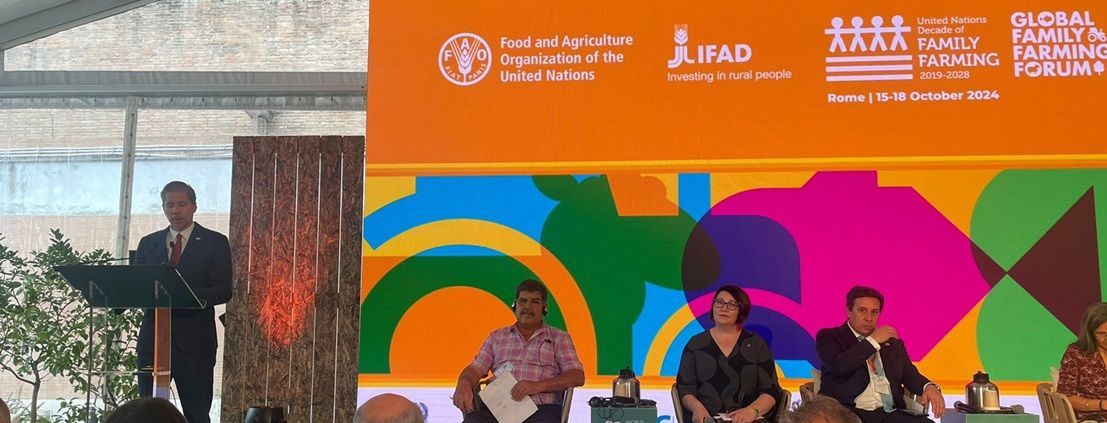Global Family Farming Forum: LVC Declares, “No More Policies That Harm Family Farming! We Need a New International Trade Framework!”

Delegates from La Vía Campesina participated in the Global Family Farming Forum (GFFF), which took place in Rome from October 14 to 18, on “Halfway through the United Nations Decade of Family Farming (2019-2028)“. José Oviedo, a delegate from CLOC – La Vía Campesina in Central America, spoke at the closing session on “Strategies for follow up -Continued Implementation of the UNDFF”, on the 17th of October. Below is his complete intervention.
Throughout the week, we have seen that while we have made some progress in the first five years of the Decade, there is still much work to be done. We face many challenges in implementing the tools at our disposal, and we need governments to listen to us and commit to small-scale family farming. Family farming—both peasant and indigenous—is the only sustainable way to feed the world, combat climate change, enrich biodiversity, and ensure a future for young people that respects nature.
Dear ambassadors and comrades, we have five years left to achieve real change in farming communities that serves the common good of the global population and prioritizes life over the interests of capital and domination.
As La Vía Campesina, we have five proposals for following up on the Decade over the next five years:
- Prioritize the Right to Land and Commons: We call for national public policies and the work of the FAO to center on the right to land and natural resources, as established in Article 27 of the United Nations Declaration on the Rights of Peasants and Other People Working in Rural Areas (UNDROP). We invite governments—especially those on the International Steering Committee of the Decade—to join us in organizing a new International Conference on Agrarian Reform and Rural Development, ICARRD+20, and to launch a new global process for agrarian reform with policies for redistributing land, water, and territorial rights in accordance with the Voluntary Guidelines on Land and Fisheries. This is especially crucial for rural women because when rural women have land and produce food, they feed their entire families and ensure food security.
- Addressing Markets and Commodity Monetization: It is crucial to note that certain public policies have contributed to climate change. Therefore, we demand: no more policies that harm family farming! We need a new international trade framework that guarantees fair prices for both small producers and consumers, freeing food from speculation, competition, and the monopolistic power of multinational corporations. As mentioned in a recent roundtable, we need a Global and National Observatory to monitor production costs. Today, as family farmers, our biggest enemy is prices that do not cover production costs. We need an Observatory that produces objective data on production costs in each country.
- Concerns About New Technologies: We are worried that discussions are increasingly focused on promoting new technologies, especially digital ones. It is a dangerous illusion to believe that the vertical deployment of technologies controlled by corporate oligopolies can address the multiple crises facing humanity. Digital technologies not only have a significant and often underestimated environmental impact, but they also perpetuate existing patterns of injustice, exploitation, and colonialism. This not only marginalizes small-scale food producers but also erodes the food sovereignty of countries as control over data and decision-making power becomes increasingly centralized in the hands of a few corporate entities and powerful states.
- Support for Peasant Agroecology: We want to acknowledge the important work of the FAO and states on agroecology, including regional and international conferences, and the need to emphasize the promotion of agroecological innovations from peasants, indigenous peoples, and small food producers. We must continue our work throughout the Decade to promote agroecology by implementing the recommendations and tools approved by the FAO. We need policies that encourage the establishment of agroecology schools in all countries to widely disseminate the knowledge and practices of indigenous peoples, peasants, and artisanal fishers on how to care for the land while producing healthy and abundant food.
- Call for Collaborative Efforts: Finally, we appeal for joint efforts between the national and regional offices of the FAO and peasant organizations to encourage governments to promote public policies in favor of family farming. We ask the FAO to assist us in fulfilling these five points according to its mandate. Beyond the work done in national Family Farming Committees, we invite governments to commit to global organizations and states to organize seminars and events on strategic topics such as agroecology, the right to land, and markets and prices.
